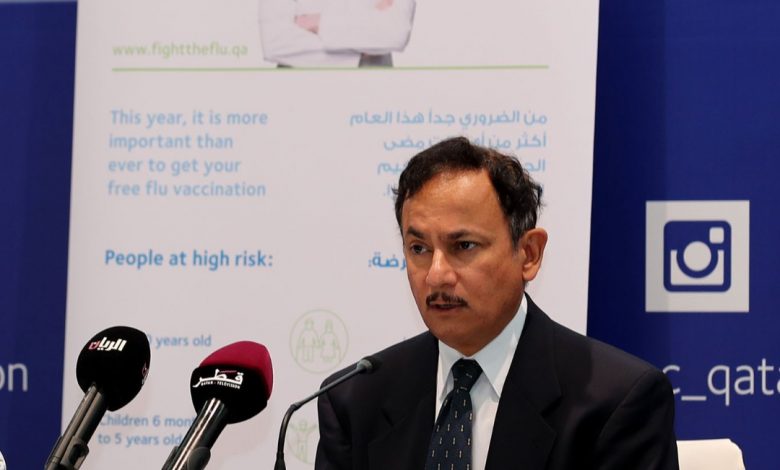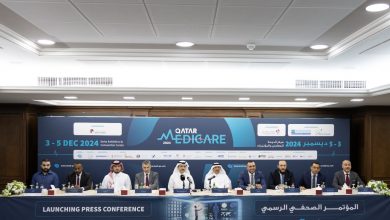
Dr. Al Khal: Qatar’s COVID-19 Response Prevented A Million Extra Cases
الدكتور الخال: إجراءات دولة قطر لمواجهة كوفيد-١٩ جنبتها مليون إصابة إضافية
QNA
Doha: Chair of the National Health Strategic Group on COVID-19 and Head of Infectious Diseases at Hamad Medical Corporation Dr. Abdullatif Al Khal, affirmed that more than a million COVID-19 infections have been prevented by the steps Qatar has taken to combat the pandemic.
Dr. Abdullatif Al Khal explained during an Al Maerifa Pubic Seminar hosted by Texas A&M University at Qatar that without the restrictions and public health measures put in place when COVID-19 struck, the impact of the virus on Qatar would have been so serious that it would have overwhelmed the nations healthcare system.
During the seminar titled Qatars Response To The COVID-19 Pandemic: Lessons Learned, Dr. Al Khal said that Qatar has been able to stay resilient and avoid having to prioritize care for some patients over others, while recording one of the worlds lowest COVID-19 mortality rates and taking some positives for the future.
“Due to the interventions we implemented, we flattened the curve to the extent that the peak number of infections was 79 percent lower than it would have been had no public health measures been taken,” Dr. Al Khal continued. “Without implementing restrictions and public health measures, the peak of the pandemic would have come very quickly and with a much larger number of infections. We can only imagine what the impact on our healthcare system would have been if one million more people had been affected, but our interventions led to an estimated 77 percent reduction in daily acute care hospital admissions.” he added.
“Every death means so much to a family and to the country, and is an extremely sad loss. However, with excellent standards of care and early detection and treatment, we have kept mortality rates very low. The response of the healthcare system on criticality and mortality has been remarkable.” he said.
Head of Infectious Diseases at Hamad Medical Corporation explained that the preparedness of Qatars healthcare system in terms of both personnel and infrastructure meant it was able to rapidly expand the number of acute care beds available, redeploy staff, and treat COVID-19 cases in dedicated facilities. “The emphasis on broad testing, coupled with proactive early treatment, may also have limited the number of people who went on to require hospitalization or develop severe or critical disease,” he added. “The early, rapid, standardized, and universal assessment and care of cases prevented much higher COVID-19 severity, criticality, and mortality.”
Speaking about what Qatar has learned from COVID-19, Dr. Al Khal said: “The pandemic has been devastating for the whole world, but nevertheless positives have come out of it. “It has demonstrated that being prepared does help, and in Qatar we have been preparing again and again for pandemics and have strengthened our infrastructure in order to deal with them. We never imagined anything of the magnitude of COVID-19 I dont think anybody did but because we were prepared, we were able to quickly respond and we are much better equipped now to deal with pandemics or other health crises in the future.”
“The pandemic has shown that there is so much good out there we have seen the solidarity of the public, and the will that everyone has shown to help and care for others and contribute to the fight against COVID-19. The healthcare system and its academic and research partners have also worked in unison and integrated to address the pandemic to an extent that has perhaps never been seen before.” he pointed out.
“We have also realized that everyone has something to share and to teach others, and that we have so much to learn from each other, and I think we are now an even smarter nation because of this. Weve learned how innovative we can be, we have a better understanding of our strengths and weaknesses, and we are better at delivery of our services, joint research efforts, and infection control. And we have come to recognize how truly valuable our healthcare professionals are, as they have worked long, long hours to take care of patients, track and trace contacts, and implement public health measures.” he continued.
قنا
الدوحة: أكد الدكتور عبداللطيف الخال، رئيس المجموعة الإستراتيجية الوطنية للتصدي لفيروس /كوفيد-19/ ورئيس قسم الأمراض المعدية بمؤسسة حمد الطبية، أن الإجراءات التي اتخذتها دولة قطر للتصدي لوباء “كوفيد-19” جنبت الدولة أكثر من مليون إصابة إضافية.
وأوضح الدكتور عبداللطيف الخال، خلال ندوة افتراضية نظمتها جامعة تكساس إيه آند إم في قطر، إحدى الجامعات الشريكة لمؤسسة قطر للتربية والعلوم وتنمية المجتمع، ضمن ندوات سلسلة المعرفة المفتوحة للعامة، أنه لولا القيود وتدابير الصحة العامة التي تم تفعليها لمواجهة “كوفيد-19″، لكان تأثير الفيروس على قطر خطيرًا إلى حد إرهاق نظام الرعاية الصحية في الدولة.
وخلال الندوة التي حملت عنوان “استجابة قطر لجائحة كوفيد-19: الدروس المكتسبة”، قال الدكتور الخال إن قطر تمكنت من البقاء صامدة أمام تحديات الوباء، وتجنبت الاضطرار إلى إعطاء الأولوية لرعاية بعض المرضى بدلاً من غيرهم، كما سجّلت أحد أدنى معدلات وفيات “كوفيد-19” في العالم، بل وخرجت من الأزمة بدروس ستفيدها في المستقبل.
وتابع بالقول “نتيجة للتدابير التي اتخذناها، استطعنا تسطيح المنحنى إلى درجة أن ذروة عدد الإصابات كانت أقل بنسبة 79 بالمئة، مما لو لم يتم اتخاذ هذه التدابير. ولولا تطبيق القيود والتدابير الصحية، لكان انتشار الوباء أوسع وعدد الإصابات أكبر. ولا يسعنا تخيل التأثير الذي كان سيحدث على نظام الرعاية الصحية لو أصيب مليون شخص آخرين، لكن تدابيرنا أدت إلى انخفاض يقدر بنسبة 77 بالمئة في الحالات الحرجة التي تدخل المستشفيات يومياً”.
وأضاف “لا شك أن كل حالة وفاة تعني الكثير بالنسبة للعائلة والدولة، وهي خسارة محزنة جداً، واستطعنا من خلال معايير الرعاية الممتازة والكشف المبكر والعلاج، إبقاء معدلات الوفيات منخفضة جداً، وقد كانت استجابة نظام الرعاية الصحية متميزة فيما يتعلق بنسبة الحالات الحرجة ونسبة الوفيات”.
وأوضح رئيس قسم الأمراض المعدية بمؤسسة حمد الطبية أن جاهزية نظام الرعاية الصحية في قطر، من حيث الأفراد والبنية التحتية، سمحت برفع الطاقة الاستيعابية للرعاية الحثيثة بسرعة، وإعادة توزيع الكوادر الطبية، وتوفير العلاج للمصابين بفيروس “كوفيد-19” في مرافق مخصصة. لافتا إلى أن التركيز على إجراء عدد كبير من الفحوصات، إلى جانب العلاج الاستباقي المبكر، قد يكونان من الأسباب التي حدّت من عدد الذين طلبوا دخول المستشفى أو الذين أصيبوا بأمراض شديدة وخطيرة، وقد أدى تقييم الحالات ورعايتها المبكرة والسريعة والشاملة والموحدة إلى الحيلولة دون زيادة شدة “كوفيد-19” والإصابات الحرجة والوفيات الناتجة عنه.
وفي حديثه عما تعلمته قطر من “كوفيد-19″، بين الدكتور الخال أن تجربة الوباء كانت قاسية بالنسبة للعالم بأسره، ومع هذا فقد كانت له جوانب إيجابية، حيث أظهر الوباء أهمية الاستعداد، “ونحن لطالما كنا نعدّ أنفسنا مرارًا وتكرارًا للتعامل مع الأوبئة، وعززنا بنيتنا التحتية من أجل ذلك. ورغم أننا لم نتخيل قطّ شيئاً بحجم “كوفيد-19″، ولا أظن أحداً آخر تخيل ذلك، إلا أن استعدادنا مكننا من الاستجابة بسرعة، ونحن الآن مستعدون بشكل أفضل للتعامل مع الأوبئة أو الأزمات الصحية الأخرى في المستقبل”.
وأشار إلى أن الوباء حفّز الناس على فعل الخير، فانتشر التضامن ورغبة الجميع في مساعدة الآخرين ورعايتهم والمساهمة في مكافحة “كوفيد-19”. كما عمل نظام الرعاية الصحية وشركاؤه الأكاديميون والبحثيون في انسجام تام ومتكامل لمواجهة الوباء إلى حد ربما لم يسبق له مثيل.
وتابع “وأدركنا أيضًا أن كل شخص لديه شيء لمشاركته وتعليمه للآخرين، وأن لدينا الكثير ليتعلمه بعضنا من بعض، فقد أصبحنا ندرك نقاط قوتنا وضعفنا بشكل أفضل، وحسنّا خدماتنا ومستوى أبحاثنا المشتركة، ومكافحتنا العدوى. كما أدركنا الأهمية الحقيقية لطواقم الرعاية الصحية، حيث عملوا لساعات طويلة لرعاية المرضى وتتبع الإصابات وتطبيق تدابير الصحة العامة”.



